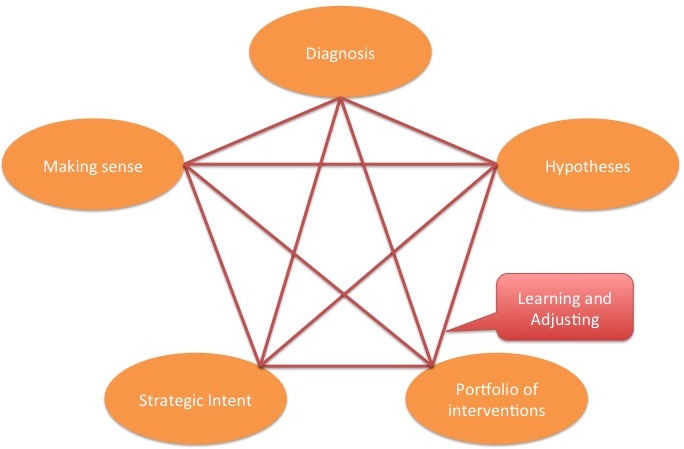Over the course of 2016, Shawn and I worked on a piece of research on systemic change in market systems development, funded by the BEAM Exchange. In this work, we question the utility of the concept of systemic change in market systems development (though this is valid in the wider field of economic development) as it is currently used and suggest a rethink. To do so, we went back to search for a fundamental understanding of economic change. This is what we found.
An alternative to a Theory of Change approach
I have been blogging quite extensively about the Theory of Change (ToC) approach in recent months. My blog posts reflect a process that I have been going through as part of my different work engagements: adapt ToC approaches to be more sensitive to the complexities development programmes face in their day-to-day work.

Different phases of Systemic Insight
In parallel, with my colleagues at Mesopartner we keep doing research on understanding complex realities and our human reaction to them based on cognitive science, understanding the process of economic change, making decisions under conditions of uncertainty, and managing highly resilient organisations. In these contexts, ToC has limited applicability and a number of drawbacks. Therefore, we have been working on an alternative approach to the ToC approach which we built from the ground up based on our growing understanding of how complex systems work and how involved actors can lead a process of exploration and change. The approach is called Systemic Insight. Continue reading
Refining the Complexity aware Theory of Change
When I wrote my last post about experimenting with new structures for a complexity aware Theory of Change (ToC) in Myanmar, I had a few elements in place, but still some questions. Going further back to an earlier post, I was clear that differentiating between clear causal links for complicated issues and unpredictable causalities for complex ones is critical. I have been thinking about that a lot and last week I have taught a session on monitoring in complex contexts and I think I have found the final piece of the puzzle. Continue reading
Experimenting with new structures for Theory of Change
Last week I was in Myanmar working with a market
systems development programme. The main task of this trip is to work on the project’s monitoring framework. To set the stage for that, we are working on revising the project’s theory of change (ToC).

A messy theory of change
Theory of Change is a bit of a contentious beast in my set of tools. As I am thinking and writing a lot on complexity and complex systems, I am aware that causality in complex systems can hardly ever be reduced to a straight line between two boxes and it is even more difficult to predict in advance how change will look like. It is not just that causalities are difficult to disentangle or predict in advance (it’s easier using hindsight), but that because of emergence there are other causalities at work than the linear material – billard-ball like – causality we are used to. But this is the topic of another blog post. So for me, Theory of Change is not an instrument to predict what change will happen but to create a coherent picture that explains why the project is doing what it is doing. Continue reading
Measuring transformations in attitudes
Following up on my last blog post on a new framework for systemic change, I would like to present here the main methodology we used to measure whether there have been transformations in the attitudes of farmers. The approach we used was Cognitive Edge’s SenseMaker®, which allowed us to deeply scan for changes in attitudes and beliefs beyond mere observation of changed behaviours. Continue reading
A new framework for assessing systemic change
Over the last year or so I was hired by a large market systems development programme in Bangladesh to develop a new framework for assessing systemic change for them. We did an initial feasibility study and then a larger pilot study. The report of the pilot study has now been published. Rather than to bore you with the whole report, I would like to share the conceptual thinking behind the framework and the framework itself in this post. In a later post, I will share the methodology. This is not the end of all wisdom and the silver bullet framework everybody has been looking for. For me this is an important step to bring my work and thinking over the last couple of years together into something practically applicable. But this work is not done as I am embarking on a longer research project on systemic change. So there is more learning to come and with it more development of this tool. Please share your thoughts, which would help me to further improve the framework. Continue reading
Mesopartner Summer Academy 2016

This week we have announced the Mesopartner Summer Academy 2016 on Territorial Economic Development. This year, the academy will have a special focus on green economic development in territories. The academy will take place from 4 to 6 July in Berlin, one of the most exciting capitals in Europe with a rich history of economic transition and development. I will be there an I hope to meet some of my readers as well. Continue reading
Don’t over-design your ToC
Getting too eager about building the perfect Theory of Change (ToC) for your organisation, programme or project can lead to an over-designed ToC that can be more of a hindrance than a help to manage and learn. It sucks up a lot of time and team resources to build but then gets out-dated extremely quickly. A ToC should be an idea that is alive and dynamic. For me a ToC is more useful if it is a sketch on the back of an envelope after an intense discussion rather than a page in a high-gloss brochure. A ToC in a complex setting is necessarily imperfect. But it can still be extremely useful. Continue reading
ToC – all harmony?
Continuing my little emerging series on Theories of Change, there is another issue that I feel is very important in connection with complexity-informed Theories of Change: they do not need to be based on total agreement among the stakeholders. On the contrary, it is important to understand where there is agreement on causalities among the stakeholders and where there is not as this gives us important insight on the complexity of specific links in the logical chain.
When we look at the Theory of Change literature, participation comes up as an important if not central element of a Theory of Change process. And it undeniably is. Bringing in a wide range of stakeholders ensures that we get all or many of the diverse perspectives reflected in the Theory of Change process – and as I have written earlier, understanding diverse perspectives is a corner stone of systemic thinking. Continue reading
Adjusting a Theory of Change midway
I got a very good feedback on my blog post last week on complexity informed Theories of Change, it was shared widely on Twitter. But I also got some questions. One person pointed out the fact that the method I described in that post was mainly focusing on new programmes that are developing their first Theory of Change. But what about programmes that are in the middle of implementation? Programmes where the programme team sense that things are not going the way they are supposed to according to their Theory of Change, Logframe or project plan. Should the managers of such programmes just stop operations and go back to the drawing board to develop a complexity aware Theory of Change? This is in most cases not possible, unless things are really going badly. How can these programmes incorporate some of the ideas of complexity informed Theories of Change?
Continue reading
